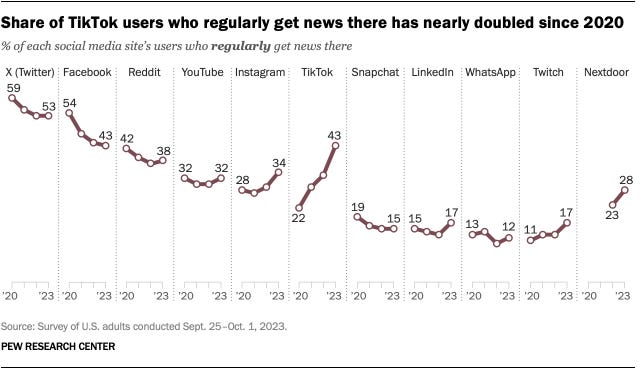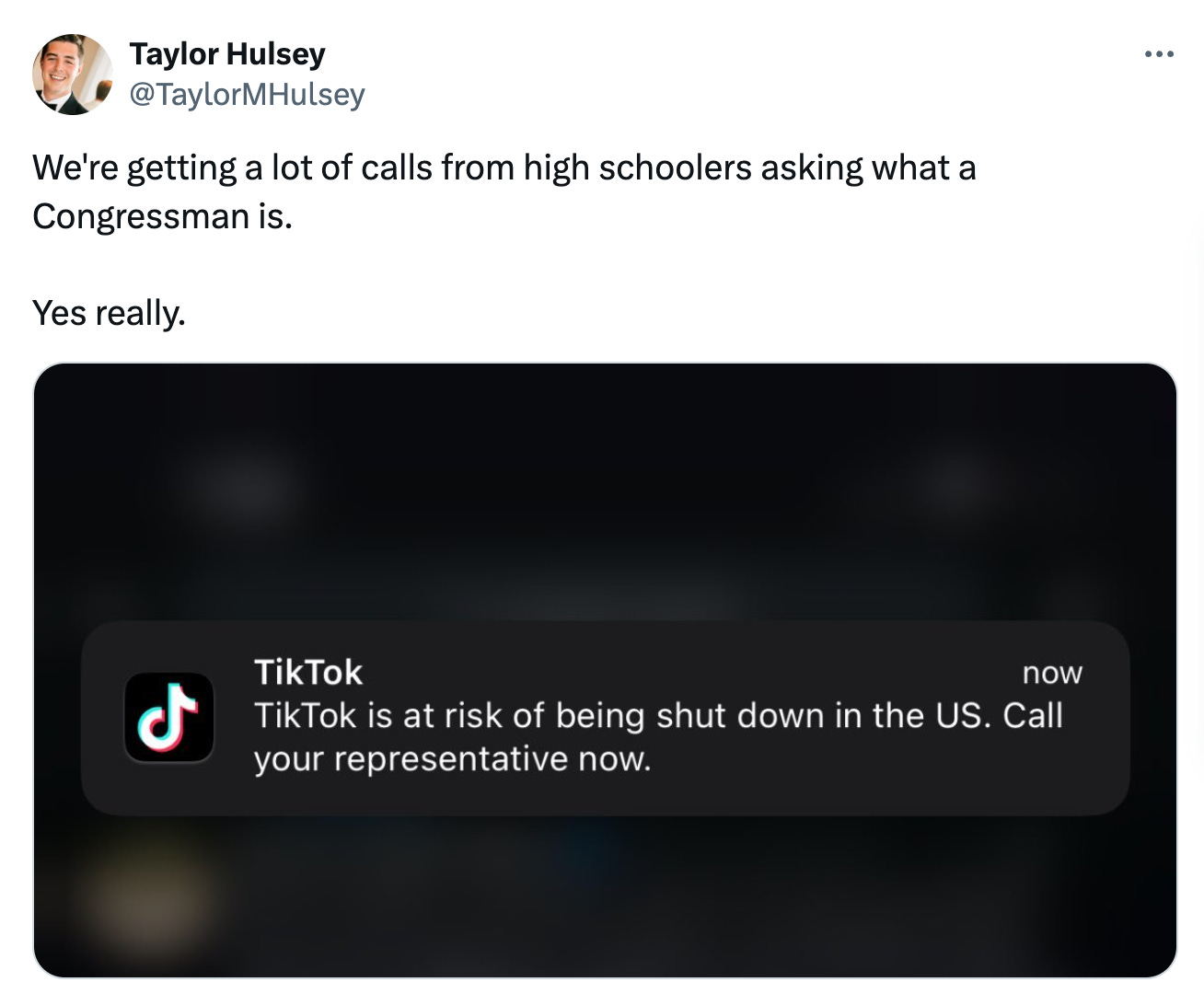“Nice mom jeans Adolph Adler!”
How TikTok's lobbying campaign backfired and might get it banned
This is the always free, reader-supported weekend edition of The Experiment, your official hopepunk newsletter. If you’d like to support my work, become a paid subscriber or check out the options below. But even if you don’t, this bugga free. Thanks for reading!
This is not an essay about whether we should ban TikTok or force the sale of Bytedance, TikTok’s owner, to non-Chinese owners. If you’re looking for an explainer or listsicle on how TikTok became the most dominant social media platform ever with Gen Z or why some say it poses a national security risk, you’re at the wrong party, pal, and I don’t see your name on the list.
If, however, you’re interested in the deeper meaning revealed by congress’ oddly bipartisan drive to force the sale of TikTok, have a seat. What we can learn from TikTok’s absurd lobbying campaign proves the old adage that when people show you who they are, believe them. And regardless of whether they are controlled by the Chinese Communist Party or Sequoia Capital, when Americans try to regulate tech companies, Big Tech fights back, often in hilariously counterproductive ways that reveal themselves as rapacious jackwagons unconcerned with the costs they impose on society.
This is not to say that one couldn’t make a good case that TikTok poses a national security risk. TikTok is privately owned by a Chinese company that—and I hope I’m using this technical business term correctly—can’t fart without the approval of China’s authoritarian government. Meanwhile, TikTok users, who skew young, are getting their news from TikTok and using the social media platform for searches more than Google. In fact, 22% of American teenage girls says they are on TikTok “almost constantly.” Basically, for a huge portion of Generation Z, what they know about the world comes from TikTok.
22% of American teenage girls says they are on TikTok “almost constantly”
Imagine that the 2024 election is going to come down to whether Gen Z turns out to vote. Now imagine that what they know about politics is influenced by a proprietary algorithm controlled to an extent by a hostile foreign power. Remember how in the old days parents were freaking out that Elvis’ hips could make little Boomer teens want to have sex? This is kind of the same thing, except now Elvis is nudging you to take Osama bin Laden’s side against the United States, or Russia’s side against Ukraine’s, or simply not to vote.
Mind you, there’s no evidence that the Chinese military is tweaking the minds of Gen Z, but Bytedance has built the infrastructure for them to do exactly that. So congress, in a rare pique of bipartisan productivity, wrote legislation to force Bytedance to sell TikTok to someone that isn’t controlled by a hostile foreign power or get banned in the U.S.
Bigger picture: After holding umpteen hearings about tech companies and specifically the dangers that social media companies pose to young people and doing a lot of nothing, Congress decided to finally do something about it. I know. I am as shocked as you are. And that’s when TikTok decided to fight back by pooping in its own hat over and over and over again.
TikTok decided to fight back by pooping in its own hat over and over and over again.
I am only barely exaggerating. Consider this: TikTok’s lobbying imperative was to show members of the House of Representatives, most of whom do not use TikTok, and their staffers, almost all of whom do, that TikTok is not trying to influence America’s youth toward a specific political outcome. This is a task easily achieved by doing nothing. So what did TikTok do?
Right before the bill came up for a vote in a House committee, TikTok users were served this message: “TikTok is at risk of being shut down in the U.S. Call your representative now.” The response came quickly.
By noon, the phone lines for members of Congress were overwhelmed by calls, according to posts from lawmakers’ staff members on X and two congressional aides with knowledge of the situation. Some of the callers appeared to be teenagers, while others hung up as soon as they were connected, the aides said. One of the aides said their office had received about a hundred of the calls and another aide said their office had received more than a thousand.
One communications director for a Florida congressman posted, “We’re getting a lot of calls from high schoolers asking what a congressman is.” This is perfect. 10/10. No notes.
The gambit backfired spectacularly. The House committee approved the measure, 50-0, and soon after the full House passed the bill, sending it to the senate. If congress is worried that you wield ill political influence over America’s youth, maybe don’t mobilize America’s youth to blatantly serve your political ends?
Some tech journalists thought the hullaballoo about the calls was overwrought. This kind of pressure campaign, they said, is what tech companies usually do. In January, DoorDash customers in New York were hit with messages about “ill-conceived” “extreme” laws to give drivers a guaranteed minimum wage. And right now, Uber and Lyft are threatening to pull out of the Twin Cities if Minneapolis and St. Paul don’t rescind a measure forcing the ride-hailing companies to pay their drivers at least $15.57 an hour.
“We’re getting a lot of calls from high schoolers asking what a congressman is.”
My point isn’t that these pressure campaigns aren’t SOP for tech companies. My point is that they have become completely normal. A government body proposes something completely reasonable—How about paying your drivers as much to deliver a Big Mac as it costs to pay someone to make it?—and tech companies wave their little light sabers around, yelling about Darth Vader.
***
In 2014, the Austin Police Department received eight complaints of sexual assault in taxi cabs. In 2015, that spiked to 27, with Uber and Lyft passengers accounting for 20 of those. Now, you know and I know that reports of sexual assault represent a fraction of the actual number of rapes, and in this case the problem with ride-hailing companies seemed to be far worse. Shortly after I began working for Austin Mayor Steve Adler, the head of the women’s shelter told us that they had started calling Ubers the “new frat houses.”
What she and the local police were calling for were stronger criminal background checks on the drivers. Uber’s drivers were, unlike taxi drivers, not subject to criminal fingerprint background checks. First, the city council pushed for fingerprinting Uber and Lyft drivers; Uber hired a horse and buggy to insult a council member as being a luddite. Then the Mayor pushed for a third-party validator to screen the drivers.
They had started calling Ubers the “new frat houses”
At first the companies agreed to the Mayor’s wonky compromise, but at the same time they were collecting signatures to force a local referendum to overturn the ordinance that—again—they agreed to. Uber contributed most of the nearly $10 million to the campaign—by multiples more than had ever been spent in a local election—to pass Prop 1, which lost. Immediately, Uber and Lyft turned off their apps in Austin and said Mayor Adler and the city council had kicked them out of town for—let’s level-set here—trying to get their drivers not to rape women passengers.
OK, you’re Uber, and you’ve just gotten your butt kicked by an entire city after trying blackmail it. This city now considers you untrustworthy, unsafe, and uncooperative. Do you:
Go on a charm offensive to win Austin over to your position?
Go back to the negotiating table to see if a deal can be salvaged? Or,
Direct your flying monkeys on social media to attack the Mayor with a torrent of homophobic-ish, anti-Semitic and otherwise vulgar abuse in hopes that, I dunno, he cowers into submission?
It was my job to monitor the Mayor’s social media accounts. Here’s a sampling of what was directed at us the day after the election when Uber and Lyft “left town.”
“please shut up and go away”
“Rename Austin, Stalinville…”
“idiot”
Those aren’t so bad, right? Surely you’re making too much… Oh my.
“suck my ass”
“Austin is another bastion of liberal bullsh**”
“suck my azz”
“douchebag”
“suck my ass. As a woman, I am trying to have fun and as a woman, I need my uber and lyft.”
And then my favorite: “Nice mom jeans Adolph Adler!” That insult still works as a comic artifact, but in service as an insult of a Jewish politician it lacked something in decorum. “Nice mom jeans” is both a set up and a punchline, elegant in its efficiency, but “Adolph Adler” doesn’t work as a topper, only as a turn into self-parody. Uber had gone too far.
The Mayor got more anti-Semitic attacks from Uber than from The Daily Stormer
As a point of reference, the Mayor got more anti-Semitic attacks from Uber than he did from the Neo-Nazi The Daily Stormer, which got all butt-hurt because after Donald Trump threatened to kick trans troops out of the armed forces, we offered to hire them locally as cops.1 If you are out naziing actual Nazis, then you’re really showing the world who you are.
To this day, I don’t know how I came up with the idea or why Mayor Adler let me do it, since he was still trying to draw them back to the negotiating table. But when I pitched him the idea of collecting all the nasty things people were saying about him and publishing them on his blog, he gave his thumb’s up, god love him. I was tired of taking their abuse and not fighting back. I wanted everyone to see what Uber was doing.
Not everyone understood why we were spotlighting truly awful abuse. The decision to publish the insults did not have universal support inside the Mayor’s office. In particular, an online reporter for the local daily seemed more interested in clutching pearls at our temerity than why the Mayor was being subjected to online abuse for trying to gently regulate a tech company.
But the online abuse stopped immediately.
Light makes the roaches run for cover.
I disagree with the Washington Post’s proclamation that “Democracy dies in darkness.” Democracy can die in broad daylight, too, as we’ve seen, and with everyone paying attention. That belief comes from the saying, “Sunlight makes the best disinfectant.” Again, recent experience disproves that supposed power of sunlight, but I will say this:
Light makes the roaches run for cover. Uck Fuber, now and forever.
Relations with Lyft were always great. In fact, Lyft’s lobbyist and I are still friends years later, but Uber’s lobbying team switched from directing online abuse to yelling at me over the phone.
Meanwhile, national reporters started covering the fight and asking for sit-downs with the Mayor. I would show up wearing a sport jacket over a custom T-shirt I’d made just for those occasions that read: “Nice mom jeans Adolph Adler!” It proved a useful conversation starter.
“Nice mom jeans Adolph Adler!”
Tech companies keep getting into these pitched battles because they believe that they are like evangelical Christians, in this world but not of this world. They want to grow their bottom line without ever considering that they are imposing a cost on the rest of us. In the case of Uber, it’s increased traffic congestion, violence against women, and obstructions to self-governance.
In the case of TikTok, it’s the clear danger of a hostile foreign power weaponizing our youth against ourselves. Right now, the outcome of this fight is in doubt. No one seems to know whether the Senate will even vote on the House bill, but Bytedance is up to their old tricks.
Senate offices have received hundreds of phone calls and voice mail messages about the bill from TikTok users in recent days, said two Senate aides, who were not authorized to discuss the calls publicly. The aides said many calls appeared to come from underage people.
This is what it looks like when tech companies turn our own people against us for profit, and it’s not new. As with Uber in Austin a decade ago, they’ve been doing it for years. It’s time to start truly regulating the tech industry by focusing on protecting children from their worst abuses. This bill to force Bytedance to find better owners is a good first step. Carving out exceptions for minors in Section 230 would be a great next step.
Or we could keep doing nothing.
Jason Stanford is a co-author of NYT-best selling Forget the Alamo: The Rise and Fall of an American Myth. His bylines have appeared in the Washington Post, Time, and Texas Monthly, among others. Follow him on Threads at @jasonstanford, or email him at jason31170@gmail.com.
Further Reading
The Mayor's Big Secret
The Curse of Austin
We set up a merch table in the back where you can get T-shirts, coffee mugs, and even tote bags now. Show the world that you’re part of The Experiment.
We’ve also got a tip jar, and I promise to waste every cent you give me on having fun, because writing this newsletter for you is how I have fun.
Buy the book Texas Lt. Gov. Dan Patrick banned from the Bullock Texas History Museum: Forget the Alamo: The Rise and Fall of the American Myth by Bryan Burrough, Chris Tomlinson, and myself is out from Penguin Random House. The New York Times bestseller is out in paperback now!
This did, however, allow me to get off this line: “The thing about white supremacists is they always do a good job disproving their own hypothesis.”









